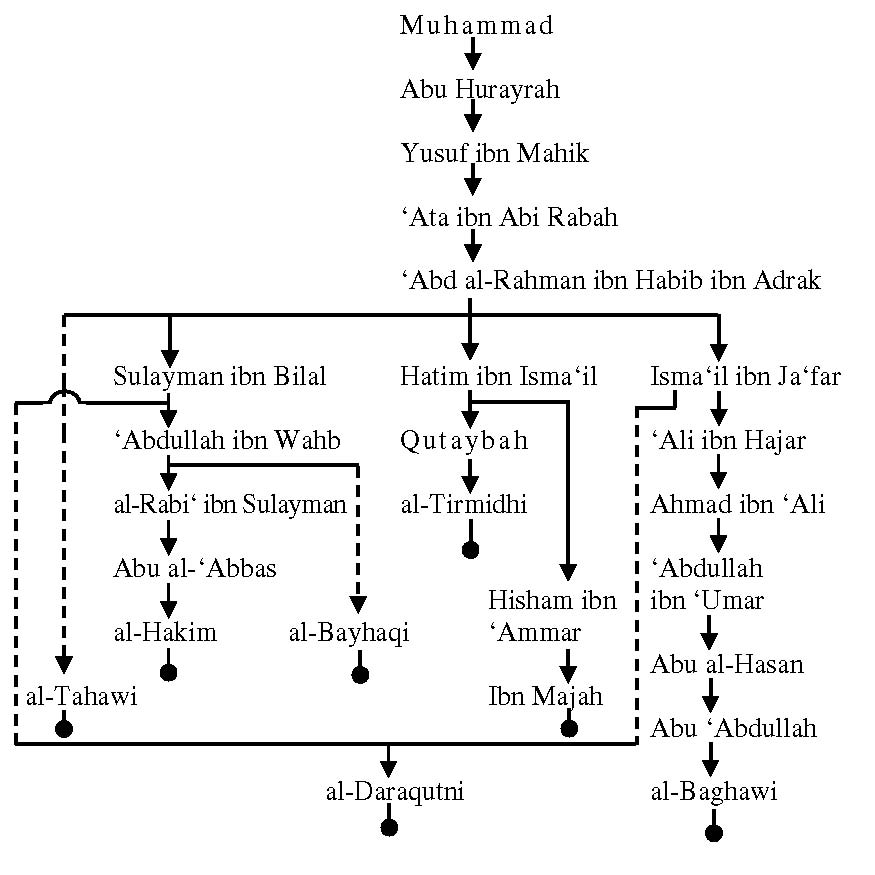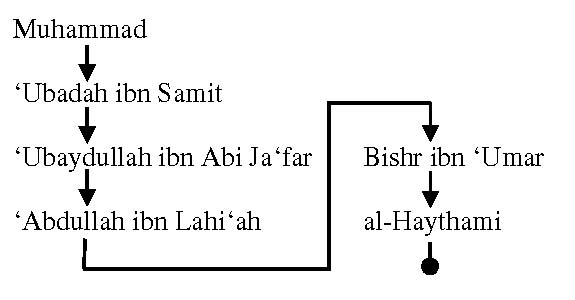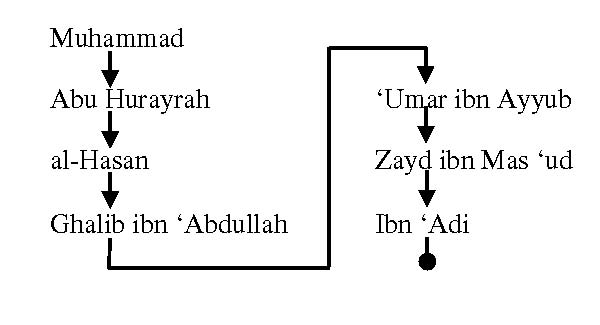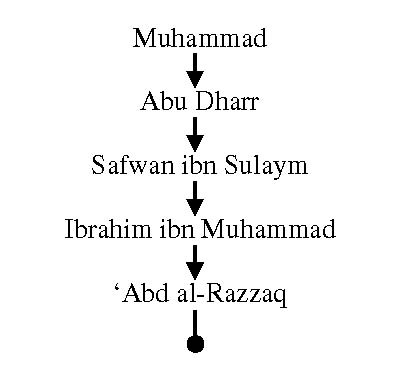(1)
حَدَّثَنَا
قُتَيْبَةُ حَدَّثَنَا حَاتِمُ بْنُ اِسْمَاعِيْلَ عَنْ عَبْدِ
الرَّحْمَنِ بْنِ اَدْرَكَ عَنْ عَطَاءٍ عَنْ بْنِ مَاهَكَ عَنْ
اَبِي هُرَيْرَةَ قَالَ قَالَ رَسُوْلُ اللّٰهِ صَلَّي اللّٰهُ
عَلَیۡهِ
وَسَلَّمَ ثَلَاثٌ جِدُّهُنَّ جِدٌّ وَهَزْلُهُنَّ جِدٌّ
النِّكَاحُ وَالطَّلَاقُ وَالرَّجْعَةُ قَالَ اَبُو عِيسَي هَذَا
حَدِيثٌ حَسَنٌ غَرِيبٌ
God’s Messenger said: “There are three things which will
treated seriously whether done seriously or in jest: marriage,
divorce and revocation of divorce.”
Following is the schematic illustration of the isnad of this
narrative’s variants:

Ibn Abi Hatim mentions ‘Abd al-Rahman ibn
Habib ibn Adrak
without any jarh or ta‘dil.
Al-Tirmidhi’s comments on the narrative are: hasanun
gharibun.
Ibn Hajar regards him to be layyin al-hadith.
Al-Nasa’i says that he is munkar al-hadith.
‘Ali ibn al-Madini regards him to be da‘if.
Ibn al-Qattan says that though a group of people like Isma‘il
ibn Ja‘far, Hatim ibn Ima‘il and Sulayman ibn Bilal narrate
from Ibn Adrak yet he is not known (la tu‘rafu haluhu).
Ibn al-Jawzi records: Yahya ibn Ma‘in regards him to be da‘if
and ‘Ali ibn al-Madini says that he is munkar al-hadith.
Abu al-Fath al-Azdi calls him to be da‘if.
(2)
حَدَّثَنَا بِشْرُ بْنُ عُمَرَ حَدَّثَنَا
عَبْدِ اللّٰهِ بن لهيعة ثَنَا عُبِيْد اللّٰه بن اَبِي جعفر عن
عُبَادَ بْنِ الصَّامِتِ ان رَسُوْلُ اللّٰهِ صَلَّي اللّٰهُ عَلَیۡهِ
وَسَلَّمَ قَالَ لَا يَجُوزُ اللّعِبُ فِي ثَلَاثٍ الطَّلَاقُ
وَالنِّكَاحُ واَلْعِتَاقُ فَمَنْ قَالَهْنَّ فَقَدَ وَجَبْنَ
‘Ubadah ibn Samit reported from God’s Messenger that he said:
“Jest is not allowed in three matters: divorce, marriage and
liberation of slaves. Thus he who even said these in jest,
they will become incumbent.”
Following is the schematic illustration of the isnad of this
narrative:

The narrative is munqata
because ‘Ubadah died in 45 AH and ‘Ubaydullah ibn Ja‘far was
born in 60 AH.
Moreover, following is the jarh on
‘Abdullah ibn Lahi‘ah recorded by al-Dhahabi (d. 748 AH):
Yahya ibn Ma‘in says that he is da‘ifun la yuhtajju bihi;
Yahya ibn Sa‘id would regard him to be nothing (kana la yarahu
shay’an); al-Nasa’i says that he is da‘if; Abu Zur‘ah and Abu
Hatim say: amruhu mudtaribun yuktabuhu li al-i‘tibar; al-Juzjani
says that there is no light in his narratives and it is not
appropriate to adduce from him.
(3)
حدثنا زيد ثنا مسعود ثنا عمر بن أيوب ثنا
غالب عن الحسن عن أبي هريرة عن النبي صلي اللّٰه عليه وسلم قال
ثلاث ليس فيهن لعب من تلكم بشيء منهن لاعبا فقد وجب عليه الطلاق
والعتاق والنكاح
Abu Hurayrah reported from the Prophet (sws) that he said:
“There are three things which if a person does even in jest
they will be implemented: divorce, liberation of slaves and
marriage.”
Following is the schematic illustration of the isnad of this
narrative:

Ghalib ibn ‘Abdullah al-Jazari is matruk.
(4)
عَبْدٌ الرَّزَّاقِ عَنْ اِبْرَاهِيْمَ بْنِ
مُحَمَّدٍ عَنْ صَفْوَانَ بْنِ سُلَيْمٍ اَنَّ اَبَا ذَرٍ قَالَ
قَالَ رَسُوْلُ اللّٰه صَلَّي اللّٰهُ عَلَيْهِ وَسَلَّمَ مَنْ
طَلَّقَ وَهُوَ لَاعِبٌ فَطَلَاقُهُ جَائِزٌ وَمَنْ اَعْتَقَ
وَهُوَ لَاعِبٌ فَعَتَاقُهُ جَائِزٌ وَمَنْ اَنْكَحَ وَهُوَ
لَاعِبٌ فَنِكَاحُهُ جَائِزٌ
Abu Dharr stated that God’s Messenger said: “He who divorced
in jest, his divorce is permissible; he who liberated a slave
in jest, his liberation is permissible; he who married in
jest, his marriage is permissible.
Following is the schematic illustration of the isnad of this
narrative:

According to Ibn Hajar, this narrative is
munqata‘.
This is evident from the fact that Safwan ibn Sulaym died at
the age of 72 in 132 AH.
This means that he was born in 60 AH. On the other hand Abu
Dhar al-Ghifari died in 32 AH.
Some background narratives though weak show
that the above narratives perhaps had a background. A person
would divorce and then take back the divorce and would say
that he was joking. At this the Prophet (sws) in order to
admonish him said that if you do this, your divorce would be
implemented.
_____________
______________________
|